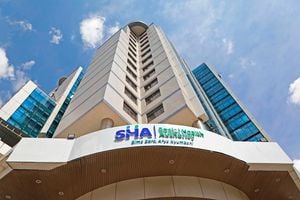Understanding the role of World Medical Association

The Kenya Medical Association Chairperson Jacqueline Kitulu during a press briefing at NHIF buildings on February 17, 2020. She is the president-elect for the World Medical Association.
What you need to know:
- The WMA may not be a body we pay much attention to as we go about our lives, but it is the one institution that is committed to fighting for our ultimate right to freedom by ensuring that sickness, our most vulnerable moment, is not used against us!
Last week, the medical world celebrated one of our own as she took the mantle as the president-elect for the World Medical Association (WMA), the first-ever African Woman to hold the position!
DrJacqueline Kitulu has been a woman of several firsts. Locally, she was the first-ever female president of the Kenya Medical Association (2016 to 2020), an association that has been in existence since 1968. She also served as a presidential appointee to the National Economic and Social Council from 2008 to 2014.
Dr Kitulu has served on many boards across the spectrum, state corporations, non-governmental and corporate ones; a testament of her leadership abilities through the years. Most importantly is that she is the family doctor to dozens of families in her private general practice. Additionally, for many female doctors seeking leadership in healthcare spaces, Dr Kitulu has remained a steadfast mentor and cheerleader! And many have followed in her footsteps, both at the Kenya Medical Association and beyond.
As she prepares to take over the presidency of one of the most critical confederations in the world in 2025, it is a moment to bring the World Medical Association home in order to understand its ultimate role.
WMA is an international organisation representing physicians. It was formerly founded on September 17, 1947, at its First General Assembly in Paris by physicians from 27 different countries. Its main purpose was to ensure the independence of physicians, to be able to work with the highest possible standards of ethical behaviour and care, at all times.
The driving force behind the formation of the WMA was the horrors observed in the Second World War, where scientists in Germany and Japan conducted horrific experiments on thousands of prisoners of war against their will. The famous Nuremburg trials sought to bring to justice the victims, though the promulgation of the Nuremberg Code, the world’s first international ethical guidance for human experimentation, to provide legal basis for the prosecution of the perpetrators.
Though the German scientists were brought to book, the Japanese ones got away with their crimes against humanity simply because they negotiated with the United States to allow access to their data, the same data that was collected inhumanely! The one take-home positive that came out of the exercise was the establishment of the Nuremberg Code as a template for modern medical ethics guidelines.
In an effort to ensure that no medical doctor ever found themselves in a similar situation, the WMA was founded as an independent confederation of free professional associations across the world, internally funded to maintain its autonomy. From 27 member national medical associations, the WMA membership has risen to proudly stand at 114 currently.
In ensuring fidelity to its mission: to serve humanity by endeavouring to achieve the highest international standards in Medical Education, Medical Science, Medical Art and Medical Ethics, and Health Care for all people in the world; the WMA provides ethical guidance to physicians through its Declarations, Resolutions and Statements, which are continually reviewed to maintain relevance, address emerging trends and protect patients and doctors.
According to the WMA website, some of the key areas of interest to the WMA include the Code of Medical Ethics, the rights of patients, research on human subjects, care of the sick and wounded in times of armed conflict, torture of prisoners, the use and abuse of drugs, family planning and pollution.
In order to achieve its mandate, WMA works closely with policy-making health authorities such as the World Health Organization at the international level. Through its member associations, the WMA declarations are enacted at country level, through collaborations between the national associations and the national ministries of health, medical professional regulators and even the national legislation organs such as the National Assembly, to safeguard health rights and ensure ethical standards in the enacting of country laws.
Some key standing declarations by the WMA that continue to guide physicians worldwide include the Declaration of Geneva, one of the oldest policies adopted by the 2nd General Assembly in Geneva in 1948. It is the modern version of the Hippocratic Oath implemented worldwide, to which doctors across the world swear to and live by, in their professional practice. It guides the physician to respect human life; maintain patient dignity, autonomy and confidentiality; and maintain respectful professional relations with colleagues at all times. This declaration has aspired to remain uninfluenced throughout decades of its existence.
The other key one is the Declaration of Helsinki. It is a statement of ethical principles for medical research involving human participants first adopted in 1964. It guides governments, researchers, ethics review boards and committees on ethical considerations for commissioning research studies involving human participants to ensure they are protected from harm and that their autonomy is respected at all times. This applies to research on pharmaceutical and other technological devices; non-pharmaceutical interventions; and even medical research with no interventions, such as study of human behaviour.
The Declaration of Tokyo seeks to protect doctors in difficult situations, where they may be used to condone harmful practices such as torture, holding without consent and extraction of information. Where physicians may be used to keep the subjects subdued, or to treat them, so as to make it possible to subject them to continued inhumane practices. To participate in such activities implies that the physician is a participant in the harmful practice, breaking a key tenet of doctor-patient relationship.
The Declaration of Taipei is a more recent addition that couldn’t be any more relevant today. With the advent of technology, access to big data is a reality we confront every day. Large amounts of health data are collected every day through patient interaction, by multiple agencies. Think about medical insurance providers who must know the reason for every payment they make. The amount of data they have on each insured person is astounding. Additionally, the volume of body tissue specimen collected by laboratories across the world for purposes of diagnosis is staggering considering that these specimens may be stored indefinitely, should one choose to.
These enormous collections of data and human specimens have the potential to drive research in huge magnitudes, to find solutions that are finely curated to populations, and resolving myriad medical problems through advances in the use of technology. However, the other side of the coin is ultimately true too; risk of abuse and misuse of health databases and biobanks is a reality we cannot run away from.
The Declaration of Taipei seeks to achieve a balance between the rights of individuals giving their tissue or data for research and other purposes based on confidentiality and privacy rules; while at the same time recognising that health data has become a very powerful tool for increasing knowledge. It acknowledges that the major risk scenarios may not result from science, but from commercialisation of the data; cost-cutting measures by insurance and governments that may leave patients vulnerable; and potential political abuse.
In principle, the Declaration of Taipei focuses on protections for individuals and populations, respecting their dignity, autonomy, privacy and confidentiality at all times; with full disclosure on the use of data and specimen in databanks and biobanks for purposes of obtaining informed consent from the patient.
The WMA may not be a body we pay much attention to as we go about our lives, but it is the one institution that is committed to fighting for our ultimate right to freedom by ensuring that sickness, our most vulnerable moment, is not used against us!
Dr Bosire is a gynaecologist/ obstetrician



